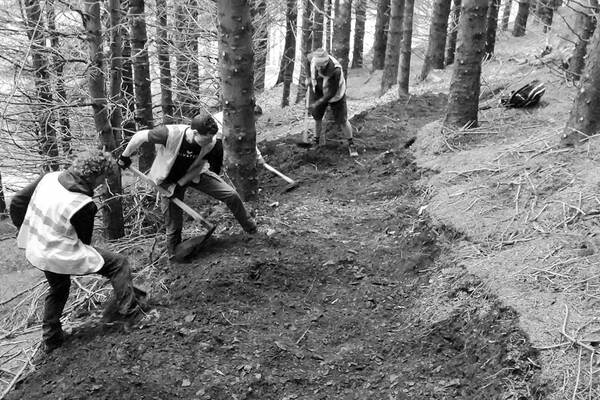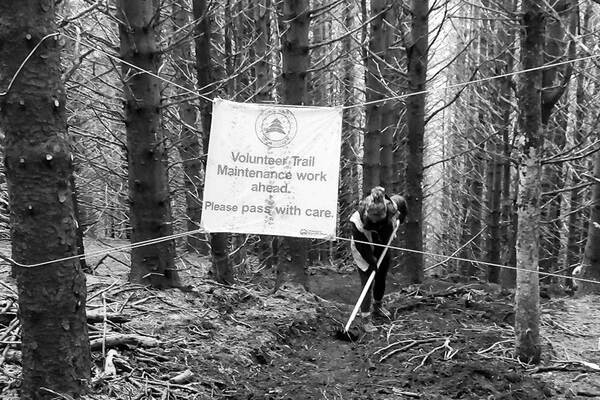Purpose
This document has been published to provide guidance and clarity on temporary use of trails by events.
Objectives
The objectives of this guidance are to:
- Ensure the trail network is returned to public use in a condition comparable to that in which it had been adopted in a reasonable timeframe.
- Ensure that there is fair remuneration for temporary exclusive use of trail(s) within the network maintained through charitable donations and volunteer hours.
Structure
Forestry and Land Scotland guidance sets out the need for a 3-way dialogue between the 3 primary Parties in this discussion: the ‘Land Manager’(LM), the ‘Event Organiser’(EO) and the ‘Trails Association’(TA). This document takes the structure of the FLS guidance and puts in place a framework to reference for these discussions.
Request To Use Trails
Event Organiser(s) to submit requests to use Trails Association maintained trails to the Trails Association.
The Trails Association will consider requests in the order that they are received, so Event Organiser(s) are encouraged to submit requests at the earliest opportunity.
The TA will consider the following:
- Trails’ ability to withstand event traffic such as:
- Incomplete or freshly completed work.
- Style of trail construction.
- Anticipated weather or seasonal conditions.
- Previously approved use, i.e. avoiding overuse.
- Event Organiser having previously failed to return trails to pre-event condition.
- Event Organiser having failed to remunerate the Trails Association for trail use or Volunteers works done.
- Input from the Trail Committee – including taking into account the wishes of the trail builder(s) towards commercial events.
- The Trails Association will aim to respond within 30 days of receiving requests, copying in both the Event Organiser and Land Manager.
Response options available to the Trails Association:
- Trails Approved for Use.
- Revise Request – Should a trail be deemed unable to withstand event traffic. The TA may suggest alternative trails or ask the Event Organiser to suggest revisions to address concerns.
- Request not to use trails for the event and the reason(s) for this.
The Trails Association's default position should be to approve requests as events promote the destination and therefore support the local economy both directly and indirectly.
The ultimate decision on trail use remains with the Land Manager.
Trails Approved for Use
Pre-Event Inspection
An inspection of the trails being used in the event shall be conducted by the Trails Association to ensure a baseline condition is known to all parties prior to the event.
This should be conducted close to the event and not before any preceding events using the same trail(s) to ensure a fair representation of the condition the Event Organiser has adopted the trail in and is expected to return it to.
The Trail Inspection master will be held by the Trail Association and be available to all three Parties.
The Trail Association may give consideration to taping of the trails for the event and be specific about taping lines at certain locations to prevent braiding. For this reason, the EO is invited to join the TA in the Pre-Event Inspection of the trails.
Pre-Event Work
It may be desirable to perform some maintenance or development work pre-event to mitigate against damage from excessive wear. Any changes to the trail must be pre agreed with the Trails Association. Work carried out by the Event Organiser should be led by suitably qualified individuals (DIRTT/ Cycling UK/or equivalent) and are conducted under the EO’s method statements, risk assessment and insurance.
Post-Event Inspection
Shortly after the event the trails will be subject to a Post-Event Inspection by the Event Organiser.
Remedial Work
Issues identified where work is required to bring the trails back up to pre-event standard will be the responsibility of the Event Organiser unless it has been pre-agreed with the Trail Association otherwise. The Event Organiser should aim to complete remedial works within 2 weeks of the event and shall ensure all remedial works are complete in no more than 3 weeks. As per Pre-Event Work, the work must be led by a suitably qualified individual and covered by the EO’s paperwork and insurance.
If the Event Organiser wishes to request the Trails Association’s assistance with remedial works, they must do so at the time of Requesting Trail Use. TA must protect its charitable income and volunteer hours. It must also protect its capacity to ensure the wider trail network maintenance continues, and it is not consumed by Post-Event Remedial Work. For these reasons, it is an option the TA wishes to only use by exception.
The Trail Association has calculated a per dig cost equating to £360 across 2021 & 2022. It is therefore intended that this cost is covered and that any volunteers are remunerated for their time at £40 per dig (half day). Multiple digs may be required to return the trails to the previous condition. It is also suggested a minimum donation of £100 is made to the Trails Association by the Event Organiser to cover their volunteer’s time on Administration to organise the post-event remedial work and as compensation for use of their capacity for work directly attributable to the event.
Return to Trails Association Inspection
After the Remedial Work has been completed or 3 weeks after the event, whichever comes first, the Trails Association shall inspect the trails to ensure the objective 1 of this document has been achieved.
Rider Levy
In order to achieve objective 2 a Rider Levy has been proposed as the means to recover some of the costs of the TA facilitating trail maintenance digs throughout the year to provide a trail network that the Event Organiser wishes to use.
| Event Fee (Up To 50 Participants) | £95 |
| Per participant, per day (from 51 – 500 participants) | £1.05 |
| Practice day, per participant | £0.55 |
| Under 18's Only Events | Free |
It is also suggested a donation is made to the Trails Association by the Event Organiser to cover their volunteer’s time on Inspections and Administration. This can be direct, or it can be agreed with the Trails Association that active promotion through the Event Organiser’s Social Media, Mailing Lists, Website and At Event Communication provides adequate benefit.




